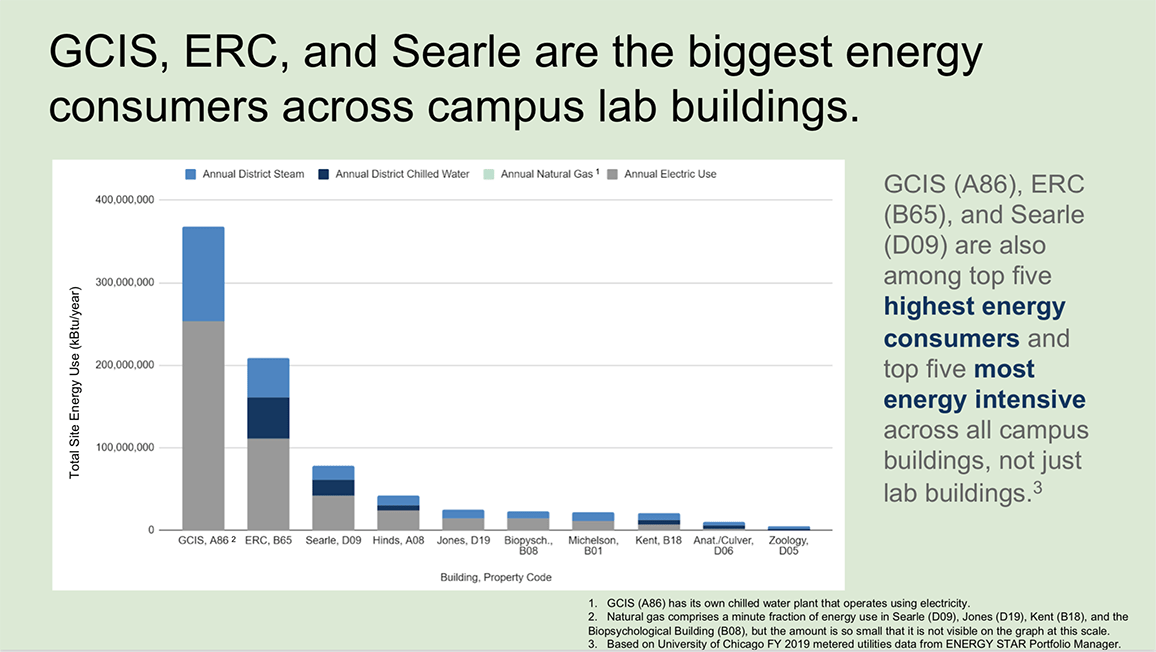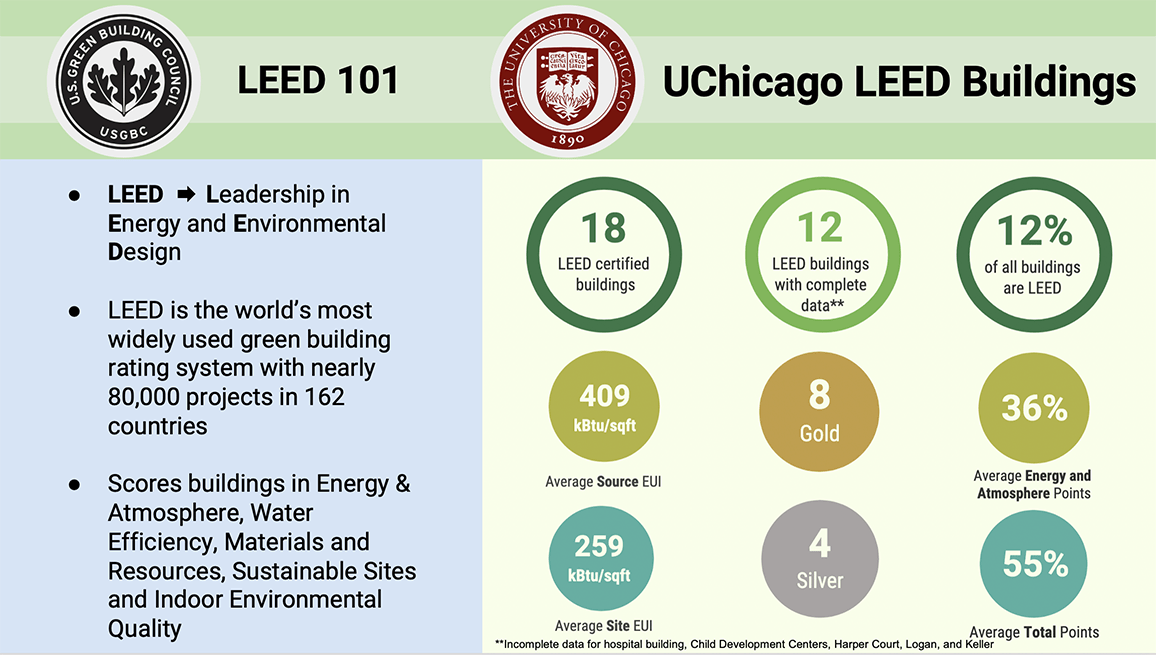EFCampus Undergraduate Student Researchers Help Improve Sustainability on Campus and Work Towards UChicago Greenhouse Gas Emissions Reduction Goals
Environmental Frontiers showcases innovative student-faculty-staff partnership to address sustainability on campus and confront pressing environmental challenges
Chicago, IL – Nine undergraduate students had the opportunity this summer to turn their environmental commitments into campus actions through the Environmental Frontiers Campus program, a part of the larger Environmental Frontiers initiative. Students from across the physical, biological, and social sciences divisions collaborated remotely in teams with University of Chicago faculty and staff for 10 weeks researching energy and water use at the University. Their overall goal was to produce analyses that would lead to actionable recommendations to improve campus sustainability.
Student projects focused on laboratory energy use—among the largest consumers of energy in campus buildings; on LEED certified buildings; and on water conservation. Teams worked with the University’s Facilities Services and Office of Sustainability, with faculty guidance from the Program on Global Environment (PGE) and the Center for Robust Decision-making on Climate and Energy Policy (RDCEP). The students were mentored by Kriti Bhardwaj, a graduate student at the Harris School of Public Policy, with support from the Mansueto Institute for Urban Innovation.
“The results from this summer’s research show what can be achieved when student passion is directed at concrete challenges faced by campus operations experts, and paired with quantitative scientific training,” said Elisabeth Moyer, Faculty Lead, Associate Professor, Department of Geophysical Sciences. “The students produced professional-quality work that can have an impact on campus practices. Their visualizations highlight our challenges—for example, University LEED-certified buildings do not outperform non-LEED certified buildings in terms of energy efficiency—and can help us going forward. The laboratory team prototyped a tool that we are continuing to refine and that will be a valuable asset to the university.”
“We all have the same goal here—students, faculty, Facilities Services and the Office of Sustainability: to make our space more environmentally sustainable and resilient, while being able to translate lessons learned in our backyard to challenges faced globally. This summer our students conducted the research needed to identify the important actions we can take at UChicago—and beyond—that will lead us on a path toward sustainable urban development,” said Sabina Shaikh, Faculty Lead, Director of Program on the Global Environment and Senior Lecturer, Environmental and Urban Studies.
The key findings and recommendations from the EFCampus cohort are geared towards assisting the University in achieving its greenhouse gas emissions reduction goal of 50% by 2030, and meeting its water conservation goals.
Labs team
Shopnavo Biswas, Eric Chen, Kimika Padilla

Ten lab buildings covering 10% of the total building area on campus contribute nearly 40% of total campus energy use. Laboratories are energy intensive buildings, primarily because their airflow requirements for safety result in energy-intensive heating, ventilation, and air conditioning (HVAC) systems. Three undergraduate students analyzed data from both UChicago and external labs to benchmark expected building energy use, and compared with laboratory standards and practices in peer institutions. The resulting lab energy benchmarking tool helps assess whether a given building is over- or under-performing, and highlights areas of potential savings. For example, adjusting minimum air change rates to match the level of risk in each space and occupancy, a practice adopted by many peer institutions, could reduce energy use significantly. The team also developed a decision-making toolkit to help faculty understand the energy use implications of lab choices. We anticipate this tool will be useful especially for incoming faculty members as they design their new laboratories. (Note: This analysis excludes The University of Chicago Medical Center).
LEED Team
Dinesh Das Gupta, Lily Mansfield, Jasmina Scekic, Mark Siedentopf

The University’s LEED buildings do not provide clear energy savings. The University has 18 LEED buildings covering nearly 20% of the total square footage of the University. Four undergraduate researchers analyzed the energy models of these buildings on campus to understand their performance, comparing them to LEED and non-LEED buildings in the same climate zone. The students found that University LEED-certified buildings only modestly outperform non-LEED certified buildings in terms of energy use. Recommendations include creating a UChicago checklist to improve energy performance in new building construction, as well as conducting regular operations and maintenance evaluations and audits, and incorporating occupant feedback on comfort and behavior to address energy inefficiencies.
Water Efficiency Assessment Team
Gillian Gagnard, Ruby Rorty

The water efficiency project undertaken by two student researchers aims to help the University reduce its potable water consumption. The team undertook a benchmarking task, analyzing universities in the Great Lakes area and in similar climate zones. The team connected with members of campus sustainability in other universities and organizations working in cutting-edge water technology. They analyzed different building use types, creating an inventory of fixtures in a classroom building, an athletic center, a residence hall, and a library to understand the water use by full-time equivalent building occupants in each category. This ongoing project will culminate in recommendations covering both behavioral change and various water conservation measures throughout campus.
“We are excited that the results from this collaborative research can be used to advance sustainability at the University. For example, the preliminary calculation tools that were built by the students are being expanded this academic year, and we hope to utilize them in our lab energy efficiency initiatives as part of this new effort,” said Alicia Berg, Assistant Vice President of Campus Planning + Sustainability at the University of Chicago.
“EFCampus provided me with a great opportunity to make a tangible impact on UChicago’s campus sustainability. Receiving regular feedback and guidance from faculty, Facilities Services, and our graduate student mentor was unique and invaluable to our research and learning. It was amazing to work with engaged and inquisitive classmates from various disciplines–each brought different skills and talents to our projects. I’ve learned so much about the infrastructure supporting the research and educational mission of the University and am awed by the efforts required to keep the lights on, water running, and heat flowing into our buildings. I plan to continue researching sustainable building design, an interest that was formed during my EFCampus experience,” said Dinesh Das Gupta, a third-year undergraduate student pursuing a BA/Masters in Public Policy with a specialization in Environmental Policy who worked on the LEED Building Performance Benchmarking team.
“What’s so satisfying about this program is the convergence of academic research, student energy, and the sustainability of our massive campus, which supports nearly 20,000 people. In everything we do at the Mansueto Institute, we look for ways to bring scientific research to bear on the challenges of cities, so that urban science can connect with the issues that people care about in their daily work and lives—one of the most critical being environmental sustainability,” said Anne Dodge, Executive Director of the Mansueto Institute.
The first cohort of EFCampus Research Assistants contributed greatly to campus sustainability efforts by providing the University with recommendations supported by data, decision making tools, and informative choices to reach their emissions reduction and water conservation goals. Moving forward, with support from the College, the University plans to expand the Environmental Frontiers initiative into the 2020−2021 academic year.
Environmental Frontiers creates student-faculty research and educational opportunities focused on the intersection of environmental sustainability and urbanization, with the goal of giving UChicago undergraduate students a scientific and practical understanding of sustainable urban development. The initiative is run by the Mansueto Institute for Urban Innovation in close partnership with PGE, RDCEP, the College, the Office of the Provost, and the Office of Facilities Services and Campus Sustainability at the University of Chicago.
Learn more at https://miurban.uchicago.edu/basic-page/environmental-frontiers/.

